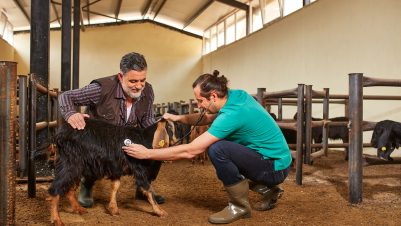This month’s article marks the last in our series looking at what we expected being a vet to be like and whether the career lives up to expectations. We began with a sixth-former at the start of the series and this month, we hear from a semi-retired vet.
Bob Lehner graduated from Edinburgh in 1974; he completed a PhD in parasite immunology, and then went into general practice. He was an early adopter of in-practice certification and obtained his Cert VR in 1988. Bob was a partner in a mixed veterinary hospital (VH) practice in Hertfordshire for 25 years. Now that he is semi-retired, Bob does part-time clinical work and is employed by the RCVS as a senior PSS assessor.
I asked him to reflect in brief on his career following the same questions as earlier articles. After a fairly gloomy prediction for the future last month, Bob looked on the bright side of what the future may hold for vets just starting out.
Why did you decide to be a vet?
I was born and brought up in Kenya, at the tail end of the British Empire. Animals played a big part in my childhood. As well as domestic pets, we had horses, ponies, donkeys and a motley collection of wildlife orphans coming through the door. At one time, collecting and swapping snakes was the schoolboy craze – until one boy was bitten by a puff adder, which put a dampener on things. I was an enthusiastic rider and did well at show jumping.
Nasty tropical diseases were a part of life – I remember seeing a favourite pony die very unpleasantly from African horse sickness – which made a lasting impression on me. In fact, I didn’t really consider any other career – although I rather pompously declared, aged 12, that I would be a research vet rather than a GP (which is where I actually ended up).
I went to a fairly brutal public school, which I loathed, but we did do Cambridge Overseas A Levels and by some miracle, I was offered a place at Edinburgh (no interviews in those days), where I arrived on a cold autumn day to start my new life in a strange foreign country.
Has it lived up to expectations?
Yes. I think us post-World War II kids really were the blessed generation. Free university education, plentiful jobs and the chance to make a good living if you found your niche in a half-decent practice. After a stab at academic research I changed tack and went into practice. I ended up as a partner in a very busy and successful mixed VH practice, mainly doing first opinion equine work, but really I was the archetypal jack of all trades. I covered just about everything – farm animal, equine, small animal, deer farming, zoo work, external vet work for a major pharmaceutical company, livestock export work, etc.
Sadly however, it wasn’t all good news and I ended up an over-stressed workaholic, and then suffered some significant health issues – basically I burnt out. I realised I would have to get out, or I was surely heading for an early grave.
If you could go back in time to the 18-year-old you, would you advise him to do it again?
Yes – I can’t think of a preferable profession – but I’d look after myself better and not be so driven by chasing material success.
If you were 18 now, would you do it?
Probably, yes – but with some reservations.
What do you think the future of practice holds for the next generation of vets?
I think we’ve all become a bit gloomy and downbeat. Certainly today’s younger graduates have things tougher than we did, with massive student loans, crazy house prices and the difficulty of finding a partnership to buy into, but equally they are often better looked after these days. Who knows how long the corporate buying spree will last – the next stock market crash or rising interest rates may well be a game changer.
I’m convinced that the good privately owned practice will always flourish and I am encouraged in my PSS work that I get to visit many wonderful practices, well managed and superbly equipped, and employing competent, enthusiastic and dedicated young graduates. I’m sure they are not all going to abandon their careers for domestic bliss and parenthood.











